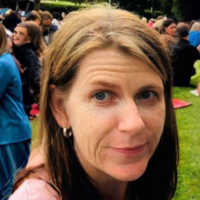
Member profile: Dr Josephine Topp
20 Nov 2025
Profile
Meet retired Fellow Dr Josephine Topp. Her psychiatry career began at Austin Health, specialising in Child and Adolescent mental health before finishing at Royal Hobart Hospital.
1. Tell us a little bit about yourself
I am 72 and live in Southern Tasmania, near a small town called Cygnet with my partner. I have been retired for 7 years. I am a grandmother of very young children who live in Shanghai and Victoria and this year, much of my time has been taken up with “granny duties”.
Otherwise I spend my time practicing yoga, singing in various choirs, sailing; my partner has a small yacht, gardening, reading and enjoying my beautiful surroundings. There is a very strong sense of community where I live, which I love and enjoy being part of. I am quite passionate about the impact of climate change on the environment and on our health, particularly mental health and am involved in various activities to that end.
2. Please tell us about your psychiatry career and the area you specialised in?
For much of my medical career, I worked in Aboriginal health as a GP, then as a Medical officer with Child and Adolescent Mental Health Services (CAMHS). I commenced my formal psychiatric training towards the end of my career and trained mainly at Austin Health, finishing at the Royal Hobart Hospital. I finished my training in 2014, specialising in Child and Adolescent mental health. I worked in private practice until 2018 when I decided to retire. I was the Tasmanian representative on the RANZCP Committee for Continual Professional Development for 4 years and also on the Tasmanian Branch Committee. I tried to advocate for action on the impact of climate change on mental health and presented a short paper at the College Congress in 2021.
3. Is there something you achieved or contributed to in your psychiatry career that you’re proud of?
I’m proud that I did the psychiatry training while in my 50s and completed it!
4. How did you get through some of the tougher years of your psychiatry journey?
In the year that I was at the Royal Hobart Hospital, I had a place south of Hobart in the Huon Valley on the coast. I loved going there and soaking up the beauty of the place as well as sailing. When I was in Melbourne, I went to my bush block in NE Victoria, as frequently as possible. I have always felt nurtured by being in the bush and loved going bush walking whenever possible. I have also enjoyed travelling and made sure that my leave always involved an adventure somewhere! My children were in their teens when I began my training in psychiatry and as a single parent (my husband had died), I was very busy with them. This kept me grounded!
5. Tell us about the personal and professional reasons that influenced your decision to retire from psychiatry practice.
I was ready for a change of pace. I had found working in the public mental health system very stressful, especially in Hobart, which is even less resourced than Victoria. I was quite burnt out.
Furthermore, I wanted to live full-time in the Huon Valley, which I loved and to immerse myself in the local community. I also wanted spend more time with my children and to further pursue my interests in yoga, music, gardening and sailing.
6. Do you have any advice for supporting psychiatrists who are making or about to make the transition to retirement?
I believe that it is helpful to make a gradual transition from full-time to part-time work. I found that this enabled me to further develop my various interests and to have the space to be able to consider what is possible when not working. I also found it helpful to not to plan too much in my first year of retirement and to be open to new and different challenges. I remained involved in the College for several years after I retired. I remained on the committee for Continuing Professional Development, and participated in the College Steering group for climate and sustainability as well as the Transition to Retirement working group. I think that these activities protected me from experiencing a loss of identity from no longer working as a medical doctor. It is also important when considering retirement to ensure that your finances are structured so that you feel financially secure.
Dr Topp was a member of the RANZCP’s Transition to Retirement Working Group, which focussed on addressing the needs of late career and retired psychiatrists. Read the Working Group recommendations, to learn more about what’s being done in this space.
More news & views
 19 November 2025
19 November 2025
Professor Kane Vellar is an inaugural Rural Champion, representing Monash Modified (MM) regions 5–7.
 17 November 2025
17 November 2025
Associate Professor Ravi Bhat AM is an inaugural Rural Champion.
 14 October 2025
14 October 2025
Kirsty Rosie is the College’s Lived and Living Experience Advisor (Carer). She shares her thoughts o...